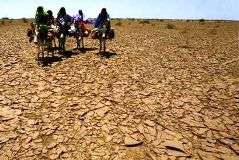Sudan’s minister for humanitarian affairs confident on progress in Darfur
By ED JOHNSON, Associated Press Writer
AP Worldstream;
AL-FASHER, Sudan, Aug 26, 2004 (AP) — Sudan’s minister for humanitarian affairs said Thursday his government has made “serious progress” in improving security and humanitarian relief in the troubled region of Darfur, as a U.N. team prepared an assessment that could decide whether the African country would be penalized.
 “The security situation has improved greatly. The delegation here has been enlightened with regard to the humanitarian effort,” Ibrahim Hamid told The Associated Press, after showing U.N. officials a dusty police outpost protecting some 43,000 people sheltering in the Abu Shouk camp.
“The security situation has improved greatly. The delegation here has been enlightened with regard to the humanitarian effort,” Ibrahim Hamid told The Associated Press, after showing U.N. officials a dusty police outpost protecting some 43,000 people sheltering in the Abu Shouk camp.
“The delivery of relief assistance is now reaching those who need it by 100 percent. The police are now deployed in the areas … and I see no possible problems in this joint evaluation,” he said.
Young policemen in blue fatigues shouldered their rifles in the blistering desert sun as U.N. deputy humanitarian coordinator Erick De Mul toured the camp, leading one of three delegations fanning out across the France-sized region to assess Sudan’s efforts toward ending the crisis.
“This is an objective verification and the U.N.’s mind has not been made up,” De Mul told AP shortly after landing in Al-Fasher, capital of North Darfur state.
Tribal leaders sheltering in a straw hut told De Mul there was no shortage of food in the camp but complained of a chronic lack of firewood to cook the rations provided by international aid agencies.
They said the displaced people, mostly women and children seeking refuge from Arab militiamen accused of killing thousands of black African farmers, had no way of knowing when it would be safe to return to the villages from which they have been driven.
Children playing the dirt stopped and stared as the U.N. convoy of several white four-wheel drive vehicles sped through the sprawling camp of stick and tarpaulin shelters. Women filling plastic jerry cans with water at a pump spoke briefly with the delegation before it continued to a makeshift office set up to record complaints of rape.
A U.N. mission member, who spent more than 30 minutes in the office, told the Sudanese minister she was told no cases of sexual abuse had been reported.
The United Nations has given Sudan until Aug. 30 to tackle what it calls the world’s worst humanitarian crisis or face economic and diplomatic punishment. It demands that Khartoum disarm the militia, known as the Janjaweed, accused of carrying out a scorched earth policy to help the government suppress two rebel factions who took up arms in February 2003.
Sudan signed a joint action plan with the U.N. on Aug. 10 to create havens in Darfur within 30 days so civilians can search for food and water and farm without fear of attack.
The plan also requires an end to government military operations and rebel groups in areas around camps and towns and villages that still have large populations.
De Mul was briefed by police and military commanders in an Al-Fasher airport waiting room, still scarred by bullet holes from a series of rebel attacks in April and May 2003.
He also met with U.N. aid workers and a Sudanese government manager at the Abu Shouk camp. De Mul said earlier obstacles to humanitarian workers and supplies had been removed, and that communication with the central government had improved.
“The access to the authorities and the possibilities to discuss and find solutions is quite good,” he said. “We look forward to a successful mission. That success depends not on us but on what you have been starting to do,” he told local officials.
The United Nations says violence has driven about 1.4 million people from their homes to some 147 camps throughout Darfur’s three states, while another 180,000 Darfur refugees have fled into neighboring Chad.
At Abu Shouk, camp manager El Fateh Abdel Aziz said his camp, patrolled by Sudanese police, was safe. But aid workers there have said women in the camp are afraid to leave to collect firewood in the surrounding scrubland and desert and that the police themselves are a threat, with some forcing sexual favors from the women.
A second U.N. team led by U.N. special representative Jan Pronk was focusing on West Darfur, while U.N. deputy special representative Manuel Aranda Da Silva was assigned to South Darfur.
A resolution adopted by the U.N. Security Council on July 30 gave the government 30 days to improve the situation in Darfur or face possible penalties. U.N. Secretary-General Kofi Annan is expected to deliver a written report on Sudan’s compliance by Tuesday and the Security Council is scheduled to meet on Sept. 2.
“We are coming very close to the moment of assessment. The clock is ticking,” Pronk said in Khartoum Wednesday.
“The responsibility is for the authorities in Khartoum not only to make promises but to implement the promises, and to show that it does make sense to continue on this road. If not, the international community has to consider what is necessary,” he said.
At peace talks in neighboring Nigeria between the government and the rebels, top government negotiator Majzoub al-Khalifa Ahmad said Thursday that the looming U.N. deadline was not a major concern.
“We aren’t bothered by the U.N. deadline at all. It never crossed our mind. We are working toward our duties for our people,” Ahmad said Thursday before going into the fourth day of talks hosted by the African Union. “We’re going to continue the talks and the deadline will pass and we will continue negotiations for as long as it takes and that could be anything between five days and one month.”
